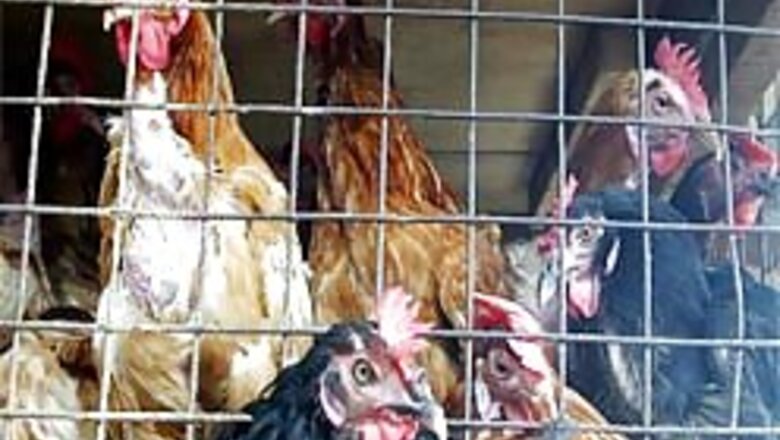
views
1. What is Bird Flu?
Bird flu or avian influenza is an infectious disease of birds ranging from mild to severe form of illness. All birds are thought to be susceptible to bird flu, though some species are more resistant to infection than others. Some forms of bird flu can cause illness to humans.
2. What causes bird flu?
Bird flu is caused by different subtypes of influenza A virus affecting chickens, ducks and other birds Viruses which cause mild disease can mutate into viruses that can cause serious disease (highly pathogenic).
To date, all outbreaks of the highly pathogenic form have been caused by Influenza A /H5N1 virus, the only subtype that cause severe disease in humans.
3. What are the symptoms of bird flu?
Symptoms of bird flu in humans have ranged from typical flu-like symptoms (fever, cough, sore throat and muscle aches) to eye infections, pneumonia, severe respiratory diseases (such as acute respiratory distress), and other severe and life-threatening complications.
4. How is bird flu transmitted in chickens and other birds?
Birds that survive infection excrete virus for at least 10 days, orally and in feces. Highly pathogenic viruses can survive for long periods in tissue, water and the environment, especially when temperatures are low.
India has been put on a alert following reports that some areas of the country have bird infected by the dealy virus.[Read]
PAGE_BREAK
5. How do outbreaks of bird flu spread within the country?
1. Domestic birds can get the infection when they:
2. Contaminated equipment, vehicles, feeds, cages, or clothing, especially shoes can carry the virus from farm to farm
3. Wet markets where live chickens and other birds are sold under crowded and sometimes unsanitary conditions
6. How is bird flu transmitted to humans?
Bird flu is transmitted to humans from direct or indirect contact with infected wild ducks and chickens through infected aerosols, discharges and surfaces.
A person handling or taking care infected chickens or came near or inside a poultry or market where there are sick chickens can inhale the particles from dried discharges or feces with the bird flu virus.
Discharges can get in contact with the nose or eyes of a person handling infected chickens.
There is no reported case of bird flu in humans after handling dressed chicken. Since the virus is easily inactivated by heat, one does not get bird flu from thoroughly cooked chicken meat.
There is no evidence of human-to- human transmission.
India has been put on a alert following reports that some areas of the country have bird infected by the dealy virus.[Read]
PAGE_BREAK
7. Why are we concerned with bird flu?
There are a number of reasons why we are concerned with bird flu:
8. What are the signs and symptoms of bird flu in chickens?
Infection causes a wide spectrum of symptoms in birds, ranging from mild illness to a highly contagious and rapidly fatal disease resulting in severe epidemics.
India has been put on a alert following reports that some areas of the country have bird infected by the dealy virus.[Read]
PAGE_BREAK
9. What are the signs and symptoms of bird flu in humans?
Bird flu is very similar to other influenza viruses. Initial symptoms are :
Causes of death and complications are:
10. Since there are so many cases of influenza, pneumonia or any other respiratory illness, when does one suspect that the patient is a case of bird flu?
One suspects that a patient with influenza or pneumonia or any other respiratory illness is a case of bird flu avian influenza if the patient has had direct or indirect contact through handling or having taken care or getting near sick chickens or other birds.
A laboratory confirmation of the bird flu infection and epidemiologic link with unusual death or epidemics of chickens will support the diagnosis of bird flu.
11. What is the treatment of bird flu?
Treatment for H5N1 infection is essentially the same as for other influenza viruses. Antiviral drugs, some of which can be used for both treatment and prevention, are clinically effective against influenza A virus strains in otherwise healthy adults and children, but have some limitations. Some of these drugs are also expensive and supplies are limited.
India has been put on a alert following reports that some areas of the country have bird infected by the dealy virus.[Read]
PAGE_BREAK
12. Is there a vaccine against bird flu?
No. The vaccine currently available against the circulating strains in humans will not protect from the disease caused by H5N1. However, it is recommended for individuals who are potentially exposed to bird flu like poultry handlers, workers and breeders to prevent recombination of avian with the human influenza virus.
13. How do we prevent bird flu?
The ban on importation of live chickens and other poultry products from countries affected with bird flu is a critical step to prevent the entry of bird flu into the country.
For poultry caretakers and handlers of chickens and other birds:
For the general public:
14. Is it safe to travel to countries affected with bird flu?
Bird flu is not transmitted from one person to another. Individuals at risk are those are directly or indirectly exposed to sick chickens and other fowl.
The government thereby advises travelers to countries affected with bird flu not to go to bird parks (aviaries), poultry farms or market where live poultry is sold.
15. How long can the avian influenza virus survive in the environment?
The duration that these viruses can survive in the environment depends on temperature and humidity conditions, but they may survive up to weeks in cooler and moister conditions.
16. What type of personal protective equipment (PPE) is recommended for those who are involved with disease control and eradication activities?
17. Should avian influenza patients wear a surgical mask?
Persons suspected of having avian influenza should be separated from others and asked to wear a surgical mask. If a surgical mask is not available, tissues should be provided and patients should be asked to cover their mouth and nose when coughing.
18. How can the respirator be cleaned after use?
Disposable respirators should not be cleaned; dispose of the respirator immediately after use according to facility policy. Reusable respirators may be disinfected using a mild
bleach and water solution (0.1 per cent sodium hypochlorite).
19. Can disposable respirators be shared between people?
No. Disposable respirators should never be shared.
20. What is the difference between a government-certified respirator and a surgical mask?
Respirators are designed to help reduce the wearer's exposure to airborne particles. The primary purpose of a surgical facemask is to help prevent biological particles from being
expelled by the wearer into the environment.
Some surgical masks are also designed to be fluid resistant to splash and splatter of blood and other infectious materials.
Surgical facemasks are not necessarily designed to seal tightly to the face and therefore air leakage
around the edges is likely. However, some respirators are designed to have the characteristics of both an approved respirator and a surgical mask.
21. How important is respirator fit?
Fit is very important. If a respirator does not seal properly to the face, airborne hazards can
penetrate or enter underneath the face piece seal and into the breathing zone.
It is very important to always follow the donning instructions and do a user seal-check or fit-check before entering the contaminated environment.
Some countries, such as the US and UK, also require fit testing. A good fit can only be obtained if the face is clean-shaven in the area where the respirator seals against the face.
Beards, long mustaches, and stubble may interfere with a good seal and cause leaks into the respirator.
Many medical facemasks, not approved as respirators, do not seal tightly to the face allowing airborne hazards to enter the breathing zone. Even those medical facemasks that appear to seal tightly to the face have not been designed to protect the wearer from airborne hazards.
They should not be considered an equivalent substitute for government-approved respirators.
(Source: www.doh.gov.ph)
India has been put on a alert following reports that some areas of the country have bird infected by the dealy virus.[Read]



















Comments
0 comment